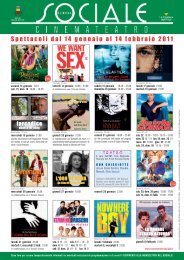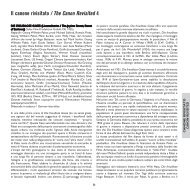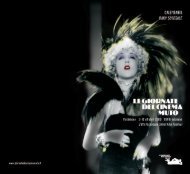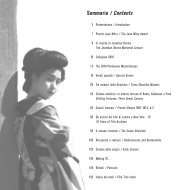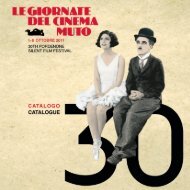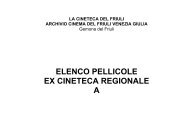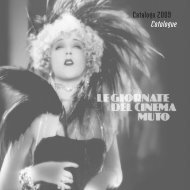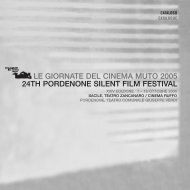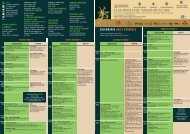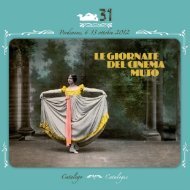Le Giornate del Cinema Muto 2006 Sommario / Contents
Le Giornate del Cinema Muto 2006 Sommario / Contents
Le Giornate del Cinema Muto 2006 Sommario / Contents
You also want an ePaper? Increase the reach of your titles
YUMPU automatically turns print PDFs into web optimized ePapers that Google loves.
2000.With the assistance of Malcolm Hooson, an organist and military<br />
music expert based in Cambridge, we found the piano parts for the 33<br />
different pieces recommended by Hutcheson; where these were not<br />
available, Hooson transposed them for piano from other parts. The<br />
performance at this year’s <strong>Giornate</strong> will be only the 10th time this<br />
accompaniment has been played since 1916, and the second time<br />
outside the UK.<br />
The score recommended by Morton Hutcheson is a medley of light<br />
classics, folk songs and tunes, military band music, and pop songs of the<br />
era, notably by Ivor Novello. We know that the music suggested by<br />
Hutcheson was used in at least ten different cinemas in England and<br />
Scotland. However, what is important is not that it was used on every<br />
occasion, but that this is likely to be the kind of music that was played<br />
when the film was originally screened.<br />
Until the discovery of this music, musical performances of the film were<br />
not only rare, but also tended to be “ironic” in style. As Stephen Horne<br />
explains, it is hard for musicians to come to this film with a blank mind.<br />
It is not an exaggeration to say that we were startled by some of the<br />
selections on Morton Hutcheson’s list. Of course, historians had<br />
reminded us that the context in which the film was first screened was<br />
very different from today, but the music helps us to appreciate that<br />
difference at a more profound level. But perhaps it is most valuable in<br />
helping the members of a modern audience, who are trying to<br />
appreciate the experience of those viewing the film for the first time in<br />
1916. – TOBY HAGGITH, con ROGER SMITHER<br />
La musica<br />
È pressoché impossibile per un musicista moderno, improvvisando la<br />
musica per The Battle of the Somme, non suonare in un modo che<br />
rifletta il nostro comune senno di poi. Il cue sheet originale di<br />
Hutcheson offre una sfida a quest’impulso, che può far sentire il<br />
musicista in egual misura legittimato e mortificato. Dalla nostra<br />
prospettiva, le sue scelte musicali variano dall’autenticamente<br />
commovente al totalmente inadeguato. Un esempio <strong>del</strong> primo caso<br />
potrebbero essere i suoi suggerimenti per le scene dei morti sul<br />
campo di battaglia, che sembrano completamente in sintonia con la<br />
pietà <strong>del</strong>la guerra. Un esempio <strong>del</strong> secondo caso potrebbe essere il<br />
suggerimento di suonare, quando i soldati vanno all’assalto la prima<br />
volta, l’ouverture <strong>del</strong>la Cavalleria leggera di Suppé. Una tentazione<br />
per il musicista è quella di eliminare qualunque offesa alla sensibilità<br />
moderna eseguendo questi passaggi problematici in modo ironico. Io<br />
cerco di evitarlo, e dopo diverse esecuzioni trovo ora una certa<br />
pregnanza nel contrasto tra lo stridente ottimismo <strong>del</strong>la musica ed<br />
immagini che hanno acquisito un significato così terribile.<br />
Nondimeno, penso che sia ancora ragionevole dare dei giudizi sul<br />
medley di per sé. Vi sono anche certi punti in cui l’ingegnosità di<br />
Hutcheson sembra venirgli meno. Per esempio, all’inizio <strong>del</strong>la Parte<br />
5 egli suggerisce che l’ouverture all’opera Das Nachtlager in Granada<br />
23<br />
[di Konradin Kreutzer, 1834] sia eseguita dal principio alla fine.<br />
Alcuni passaggi hanno scarsi legami con le scene che accompagnano,<br />
così qui penso che un po’ di sano lavoro di correzione sia<br />
giustificato. Dopo tutto, non è certo una novità per i musicisti<br />
giudicarsi a vicenda nel proprio lavoro, e si può di certo immaginare<br />
una band ribelle che nel 1916 suonasse facendo il doppio gioco con<br />
questo cue sheet. Nel complesso, tuttavia, penso che lo scopo<br />
<strong>del</strong>l’esecuzione di stasera sia quello di presentare Hutcheson nella<br />
miglior luce possibile, anche se questo comporta un numero di<br />
equilibrismo tra la fe<strong>del</strong>tà e la reinterpretazione partecipe.Alla fine,<br />
nonostante alcuni momenti alienanti, penso che la sua selezione<br />
formi una partitura sorprendentemente efficace, in parte perché<br />
mostra la stessa tensione che Toby Haggith ha trovato nel film<br />
stesso: tra un senso <strong>del</strong> dovere propagandistico ed il desiderio di<br />
dare un’atterrita testimonianza. – STEPHEN HORNE<br />
The music<br />
It is almost impossible for a modern accompanist, when improvising for<br />
Battle of the Somme, not to play in a way that reflects our shared<br />
historical hindsight. The original Hutcheson cue sheet presents a<br />
challenge to this impulse, which can make the musician feel in equal<br />
parts validated and humbled. From our perspective, his musical choices<br />
vary from the genuinely moving to the wildly inappropriatejn example of<br />
the former would be his suggestions for the scenes of battlefield dead,<br />
which seem fully attuned to the pity of war. An example of the latter<br />
might be the recommendation to play Suppé’s Light Cavalry<br />
Overture, as soldiers go over the top for the first time. One temptation<br />
for the musician is to undercut any offence to the modern sensibility by<br />
playing these troublesome passages ironically. I try to avoid this, and<br />
after several performances I now find poignancy in the contrast<br />
between the music’s strident optimism and images that have acquired<br />
such terrible meaning.<br />
Nevertheless, I think that it is still reasonable to make judgements about<br />
the medley on its own terms. And there are certain places where<br />
Hutcheson’s ingenuity seems to desert him. For example, at the<br />
beginning of Part 5 he suggests that the overture to the opera Das<br />
Nachtlager in Granada [by Konradin Kreutzer, 1834] be played straight<br />
through. Some passages bear scant relation to the scenes that they<br />
accompany, so here I think a little judicious editing is legitimate.After all,<br />
it is hardly a modern phenomenon for musicians to pass judgement on<br />
each others’ work, and one can certainly imagine a rebellious cinema<br />
band in 1916 playing fast and loose with this cue sheet. Overall, though,<br />
I think that the point of tonight’s performance is to present Hutcheson<br />
in the best possible light, even if this involves a balancing act between<br />
fi<strong>del</strong>ity and sympathetic reinterpretation. In the end, despite some<br />
alienating moments, I think that his selection forms a strangely effective<br />
score, partly because it displays the same tension that Toby Haggith has<br />
found in the film itself: between a sense of propagandist duty and a<br />
desire to bear horrified witness. – STEPHEN HORNE<br />
EVENTI MUSICALI<br />
MUSICAL EVENTS



